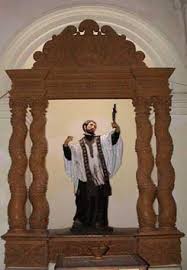Whosoever, therefore, knowing that the Catholic Church was made necessary by Christ, would refuse to enter or to remain in it, could not be saved.-Lumen Gentium 14, Vatican Council II (1960-1965)
Yes those who know that the Catholic Church was made necessary by Christ and refuse to enter or remain in it could not be saved.
However even those who do not know and do not enter into it could not be saved.
This was the traditional teaching of the Catholic Church. I have given examples below.
However the Letter(1949) says those who knowing the Church...refuse to enter in it, will not be saved, since the the Letter assumes that being saved in invincible ignorance is an exception to the dogma outside the Church there is no salvation. It assumes there are visible and known people saved outside the Church in invincible ignorance, through no fault of their own.


So the natives in the Americas' would also be on the road to salvation before the missionaries went there.


It was also superfluous for St. Francis Xavier and the Jesuit missionaries to go to India since the natives there in ignorance, would any way be saved. This was the reasoning of the Letter of the Holy Office 1949.
So the natives in the Americas' would also be on the road to salvation before the missionaries went there.
It was also superfluous for St. Francis Xavier and the Jesuit missionaries to go to India since the natives there in ignorance, would any way be saved. This was the reasoning of the Letter of the Holy Office 1949.
It wrongly assumed that there were known cases of non Catholics saved in invincible ignorance and then restricts salvation to only those who know.
But there are no known cases of non Catholics saved outside the Church with the baptism of desire, baptism of blood and invincible ignorance, and without the baptism of water.
So the Letter does not say
According to Catholic doctrine, the followers of other religions
are oriented to the Church and are all called to become part of her. (CDF, Notification on Fr. Jacques Dupuis sj,2001. Emphasis added )
The Letter does not say:
Whosoever will be saved, before all things it is necessary
that he hold the catholic faith. Which faith unless every one do keep whole and undefiled, without doubt he shall perish everlastingly.(Athansius Creed)
The Letter does not say:
"The most Holy Roman Church firmly believes, professes
and preaches that none of those existing outside the Catholic Church, not only pagans, but also Jews and heretics and schismatics, can have a share in life eternal; but that they will go into the "eternal fire which was prepared for the devil and his angels" (Matthew 25:41), unless before death they are joined with Her...- (Cantate Domino, Council of Florence 1441. Extra ecclesiam nulla salus. Wikipedia)
The Letter does not say:
.. to be saved it is not enough to be any sort of member
of the Catholic Church; it is necessary to be a living member. (Catechism of Pope Pius X.24Q)
Neither does it say:
A. No, no one can be saved outside the Catholic,
Apostolic Roman Church, just as no one could be saved from the flood outside the Ark of Noah, which was a figure of the Church.(Catechism of Pope Pius X. 27 Q etc.)
Instead the Letter (1949) assumes there
are exceptions and this is repeated in Vatican Council II (LG 14, AG 7).
Now we know that invisible cases of
the baptism of desire, baptism of blood and being saved in invincible ignorance never ever were visible exceptions to the dogma extra ecclesiam nulla salus. The Letter of the Holy Office 1949 made a mistake. But in 1960-1965 at Vatican Council II they did not know that this was a mistake.
So the result is that the first part of
Lumen Gentium 14 in blue is orthodox and the second part in red comes from the Letter of the Holy Office 1949.
Lumen Gentium 14. This Sacred Council wishes to turn
its attention firstly to the Catholic faithful. Basing itself upon Sacred Scripture and Tradition, it teaches that the Church, now sojourning on earth as an exile, is necessary for salvation. Christ, present to us in His Body, which is the Church, is the one Mediator and the unique way of salvation. In explicit terms He Himself affirmed the necessity of faith and baptism and thereby affirmed also the necessity of the Church, for through baptism as through a door men enter the Church. Whosoever, therefore, knowing that the Catholic Church was made necessary by Christ, would refuse to enter or to remain in it, could not be saved.
It is the same with Ad Gentes 7.
Ad Gentes 7 : Therefore, all must be converted to Him,
made known by the Church's preaching,(Lionel: Only those who have been preached too?) and all must be incorporated into Him by baptism and into the Church which is His body. For Christ Himself "by stressing in express language the necessity of faith and baptism (cf. Mark 16:16; John 3:5), at the same time confirmed the necessity of the Church, into which men enter by baptism, as by a door. Therefore those men cannot be saved, who though aware that God, through Jesus Christ founded the Church as something necessary, still do not wish to enter into it, or to persevere in it." Therefore though God in ways known to Himself can lead those inculpably ignorant of the Gospel to find that faith without which it is impossible to please Him (Heb. 11:6), yet a necessity lies upon the Church (1 Cor. 9:16), and at the same time a sacred duty, to preach the Gospel. And hence missionary activity today as always retains its power and necessity (Lionel: But with there being exceptions to the dogma EENS and the necessity for all with no exceptions to be members of the Church for salvation).
So when we read Vatican Council
II we have to be aware of hypothetical cases being mistaken for being objective examples of salvation outside the Church.
We have to be especially careful
when reading Lumen Gentium 14 and Ad Gentes 7.
-Lionel Andrades
|


